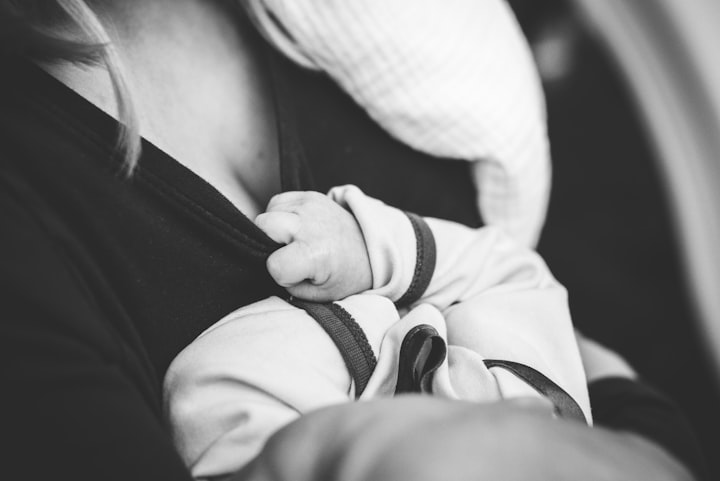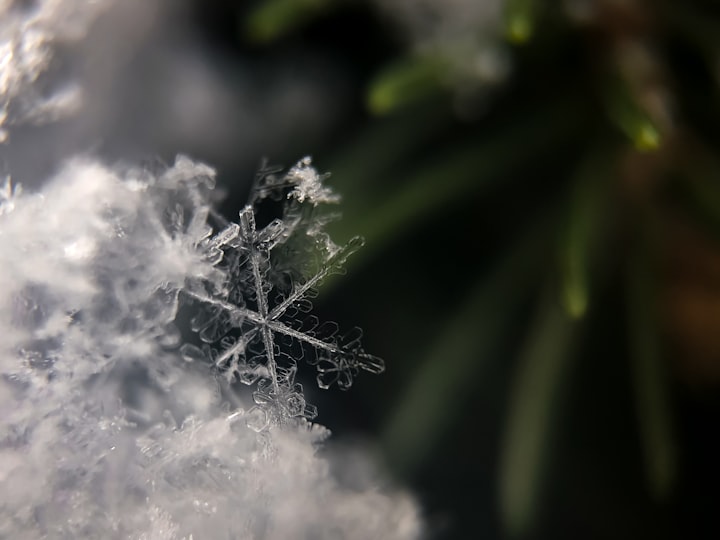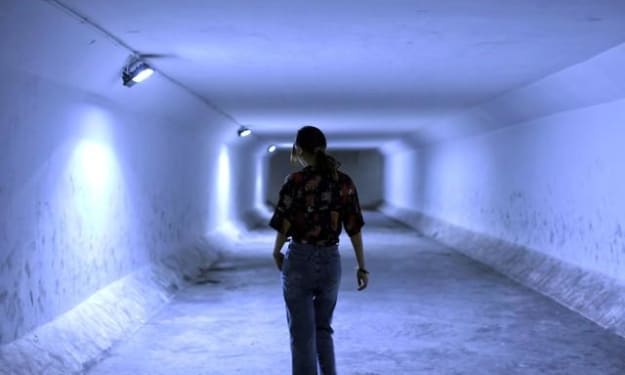The Paradox of Postpartum Depression
How can I be happy, and yet so sad?

I feel like I’m drowning. Some days are better than others. There are days when I can make it to the surface so I can take a deep, exasperated breath before I sink back into the depths. Where it’s cold. Where it’s dark. Where all hope and joy and self-love are pulled from your soul- it’s like a nightmarish hand pushes through your ribcage and pulls out your still-beating heart.
Postpartum paradox
I’ve got the life I’ve always wanted. My life is full of love. I have a man who loves and respects me. He’s more than just a boyfriend; he’s a partner. My equal. Anyone who sees us together can see that we love each other, support each other, encourage and adore each other. I love him more than words could ever come close to describing. He’s the One. Together we have 3 boys- his 12-year-old and my 6-year-old from previous relationships, and the 2-month-old we made together. But we don’t think in terms of ‘his’ and ‘mine’- they’re our kids and we love them all. I absolutely love that I can support my family with my writing. I am cultivating the career of my dreams -I’ve wanted to be a professional writer/author since I was 6 years old.
How many people can really say that their life is perfect? I mean, nothing is perfect, but my life is pretty dang close. Everything I have ever wanted is laid out before me, and I am grateful for each and every blessing each and every day. I’m just as thankful for the downs as I am the ups — for example, when my bank account is in the red, I’m grateful that I had the money to pay the bills and buy food and clothes and everything else my family needs. I make a point to never take anything for granted. I’m more than happy in life — I’m satisfied. I feel fulfilled.
And yet, I feel sad. So, so, sad. I feel empty and worthless. How is it possible I’m happy and depressed? How do I feel fulfilled, and yet empty and worthless? I know I’m not ugly or obese, but there are times I can’t help but wonder how is it that my partner can stand to touch me, kiss me, make love to me because I feel so…gross. I wasn’t like this before. I was confident, cheerful, optimistic, and refused to feel stressed no matter how stressful the situation was. I mean, of course, I wasn’t chipper 24/7 — I have 3 boys so obviously I would get annoyed, sometimes straight pissed off. But I was quick to smile, and I laughed easily. Not anymore, though. It’s a paradox. I’m happy, but I’m depressed. I’m confident, but I feel ugly and unattractive. I have an amazing support system, but I feel overwhelmed.
Subtle and sneaky sadness
For me, it came on subtly. Day by day, the sadness seeped in, like cold air from a drafty window. I remember thinking “What is wrong with me?” — several times a day. So, I did some research. I learned about what Postpartum Depression is, the difference between it and the “baby blues”, what causes it, and how long it can affect someone.
Brought down by the baby blues
According to the Mayo Clinic, the ‘baby blues’ is very common in mothers right after birth, with symptoms that last only a week or two. Symptoms of baby blues are as follows:
- Irritability or mood swings
- Sadness
- Anxiety
- feeling overwhelmed
- crying often
- difficulty concentrating
- poor appetite, or insatiable appetite (eat too little or too much)
- sleep issues (i.e. sleeping too much, or not sleeping at all)
As I said, the baby blues only last a week or two. Postpartum depression, on the other hand, is a little more serious and vastly misunderstood.
Postpartum depression
It’s not uncommon for postpartum depression, or PPD, to be dismissed as the baby blues. However, the symptoms of PPD are more severe and last much longer. They could be so intense that they interfere with your ability to handle daily tasks, or care for yourself or your baby. PPD typically develops a few weeks after birth, but it’s possible to develop sooner- such as during pregnancy- or later, as much as a year after birth. When I think about it, I think mine started during pregnancy. I remember feeling overwhelmed, stressed, anxious. Then again, when I was about 30 weeks along I developed a rather serious case of pancreatitis that resulted in 14 days of hospitalization and another 2 weeks of recovery. Not to mention the week I was sick before being hospitalized. So I was broke. My house was a mess. My family was beyond done with helping me with my elder son, and my partner was stretched to his limit spending so much time in the hospital with me while trying to be a dad to his son, and a dutiful son to his widowed mother. Things are still not quite 100% — I mean, healthwise they are, but financially, I’m still struggling.
The chemical changes involve a rapid drop in hormones after delivery. The actual link between this drop and depression is still not clear. But what is known is that the levels of estrogen and progesterone, the female reproductive hormones, increase tenfold during pregnancy. Then, they drop sharply after delivery. By 3 days after a woman gives birth, the levels of these hormones drop back to what they were before pregnancy. In addition to these chemical changes, the social and psychological changes of having a baby create an increased risk of depression.
Symptoms of PPD, per the Mayo Clinic:
- depressed mood or severe mood swings
- crying often
- withdrawing from family and friends
- loss of appetite or eating much more than usual
- inability to sleep (insomnia) or sleeping too much, often accompanied by intense fatigue or restlessness
- little to no interest and/or pleasure in activities you used to enjoy
- irritability and anger
- worrying that you’re not a good mother, as well as feeling like you’re worthless.
- feelings of shame, guilt, or inadequacy
- feeling hopeless, sadness, emptiness
- difficulty concentrating and making decisions
- Severe anxiety and panic attacks
In rare instances, women feel suicidal or have thoughts of harming their baby. There are also cases, not as rare but still not as common as people think, in which women have difficulty bonding with their babies. This is probably the most common misconception about PPD- that those who suffer from it are unable to bond with their baby. That’s not the case. It can happen, though. Thankfully, I have a beautiful bond with my son despite the issues we had with breastfeeding. I was so sure that we wouldn’t establish a connection because I couldn’t nurse him, and maybe it would be stronger if I had, but we did bond and I’m so grateful for that.
Road to recovery
If you think you have PPD, or even if you think you have the baby blues, you should tell your doctor.
Now, I’ll admit, I have not told my doctor. I’ve only told my partner that I think I have it, as he’s noticed a drastic change in me. What he doesn’t know is that even when I’m in a “good” mood, my thoughts are dark and cynical. Even though I appear happy, I’m still sad and still feel worthless. I don’t want to die -I love my family too much to ever want to leave them. I know that the dark and sinister thoughts telling me they’d be better off if I was gone are wrong. At least I hope they are, as it would mean I’m selfish because nothing would ever make me abandon my family in any shape or form. I know I should see a doctor, but we have so many things going on, I just haven’t the time, nor the motivation, to do it. I don’t want to be pumped full of pills. I don’t want a therapist who will scoff at my spirituality. I know these excuses are probably rooted in the PPD, but it’s the truth.
There are things I’m going to try that have been found to be helpful in reducing symptoms of PPD. For example, I have been making a point to get out of the house at least once a week to go to the grocery store by myself. It’s not the most restful ‘me time’, but I can decompress, and that’s what’s important. Eating healthy and exercising are supposed to be helpful, too, according to Healthline.com. My appetite has been wonky, but I try to make a balanced meal a couple of times a week so I get the nutrients of whole foods into my body. I want to get back into my spiritual practices, again, as well. They helped me climb out of a deep, dark depression a few years ago, and so I expect it would help with this.
***
I’m hoping that by sharing this very personal, private issue that I’ll find the courage to get help. Or that simply talking about it will help me feel a little better. But, honestly, I am sharing because I know there are women out there going through the same as me who can’t speak up, and I’m hoping that if they see me do it, they will too. I can’t pretend that I want the best for myself, because I find it very hard to like myself these days. Well, it’s not that I don’t like myself, but I’m very apathetic about myself lately. I don’t care either way. And that’s bizarre, as I used to love myself. I mean, I remember not too long ago unabashedly admitting that I adored myself — and I meant it! I miss being that way- I miss being this happy, self-adoring, bubbly, sort of weird, woman. She’s still around, her light still flickering deep within my soul. This depression can try as it might, but it won’t put out her light.
…it won’t put out my light.
About the Creator
Amanda Wilson
Mother, artist, spiritually aware, and a little weird...
Writing is my passion, my art, and my career. Through writing I share my experiences, lessons I've learned, and stories I create.






Comments
There are no comments for this story
Be the first to respond and start the conversation.